by Molly Hurford
— Fitness Journalist, The Consummate Athlete
It’s a fairly standard scene: A crew of arborists gets to their job site for the morning and starts unloading gear out of the truck.
But with the arborists from Maple Hill Tree Services, the scene looks a little different: On any given day, the crew might be comprised entirely of women. Out of the 14 field staff at the Burlington-based company, 6 are women, and they’re changing the face of the tree-climbing industry.
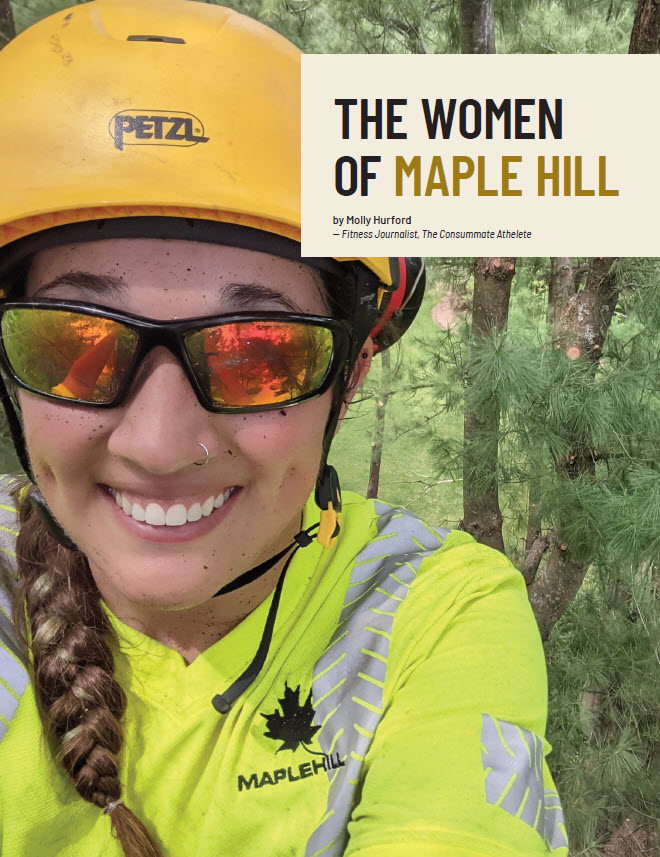
Jenna pruning a white pine
“Maybe it’s not normal to have so many women on staff, but it’s amazing!” says Maple Hill’s Serena Soucy.“ The days we have all women crews are so much fun, and we get such a positive response from clients most of the time. People come up to us and are like, ‘Wow, this is awesome to see.’”
“It is really nice to work in such a male-dominated industry with a bunch of other women,” adds fellow crew member Jenna DeAbreu. “You show up to jobs and people say, ‘Oh, my goodness, there are girls on crew.’ And mostly, people are stoked. It is really great when our clients are excited to have women on the crew.”
How does one firm attract so many women, many of whom have been on staff for years? Simple: Let them know that arboriculture is a career option, and invite them in.
“I’ve always liked being outside, but I’d never worked in an outdoor job. This was a complete 180° turn from what I was doing before,” says Shea Martin, who’s been working at Maple Hill since 2015. “I have an English degree, and after university, I was working in a cafe in Toronto and met someone who was an arborist. She mentioned the pre-apprenticeship program. I did it and eventually ended up at Maple Hill. I’ve been here ever since.”
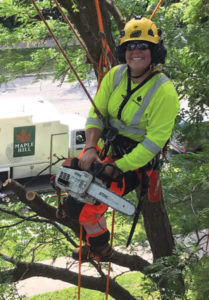
Ciara deadwooding a honey locust
“I went to university for conservation natural resources at the University of British Columbia, and I have a Bachelor of Science in National Resources Conservation,” says Soucy. “When I graduated and moved back to Ontario, I wasn’t sure what I wanted to do. I was trying to figure out where to go from there that would keep me in an outdoor work environment. I came across the Arborist Groundworker Training Program. They put my first chainsaw in my hands and taught me how to fell a tree and safely operate around the equipment that we use, and they helped set me up with my first company.”
“I knew I wanted to do something in the field, though I thought it would be maybe more in the lines of Ministry of Natural Resources or Parks Canada,” she adds. “But once I started working in arboriculture, I loved it. I spend every day outside, I feel so physically fit, and I’m using a lot of the knowledge that I learned in my degree while still interacting with people and trees. It wasn’t exactly what I thought I would be doing. But it definitely checks all of the boxes.”
“When you’re in high school, people are like, ‘Oh, you should go to university,’” says DeAbreu. “As a woman, nobody ever suggests trade school, I originally went to school for Media Studies and photography; after school, I realized that being in the city all the time, in an office, wasn’t for me. I need to do something that’s not the same every day, something that challenges me. Sitting at a computer is exhausting in a totally different way than physical labour.”
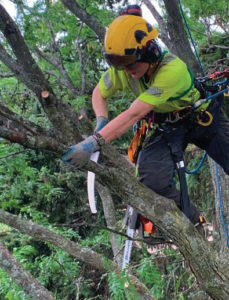
Serena deadwooding a honey locust
Now, DeAbreu works with Girl Guides as a leader and makes sure that the girls know they have more options than ever before.
And there seems to be a shift happening that’s allowing more women to find their way into typically male-dominated trades. “After going through the apprenticeship program and starting to work in the industry, I had people at work and at home backing me saying, ‘You’re in the right industry, you’re going to do great, and just ignore what anyone else has to say,’” says Crystal Wetherell, who found the apprentice program through a Facebook ad. “It comes down to passion, too. As soon as I started doing this, it felt right. I’d gone most of my life not really knowing what I wanted to do. And then as soon as I started doing this, it clicked.”
Of course, it’s impossible to talk about being women in a male-dominated industry without addressing the fact that there are still negative moments. “A lot of people are just so surprised that it’s going to be a woman cutting down their tree. And that surprise does get annoying over time,” says Martin. “When you have finished a job, people are like, “Wow, I can’t believe you did that,” it can feel condescending. There are also are times when I get singled out. I was on crew with two men, and we had a client ask just me what my mother thought of me doing this. Honestly? My mom is happy I have a job that I like.”
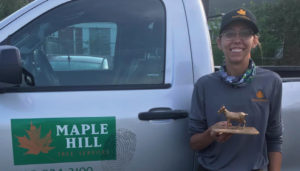
Crystal with her award as employee of the month!
“The majority of sexism and prejudice that I’ve encountered, in this industry, is outside of the workplace,” says Jessica Van Vliet, who is currently the senior consulting arborist at Maple Hill.
Jess has been in the industry for ten years now. “Passers-by and clients tend to have much more to say than any of my co-workers have. And, most of those comments that do come, come from older men, and women too! My biggest problem is running into fools while we’re working who say stuff like, ‘Oh, girls can’t do that,’ all while I’m currently doing it.”
“Working at Maple Hill is just so much fun because of the atmosphere! There are a lot of women who understand exactly what women in arboriculture have to overcome; it’s an easy chat when you need support,” adds Maple Hill’s, Ciara Condon. “And in addition to the women, the men who work here are also awesome!”
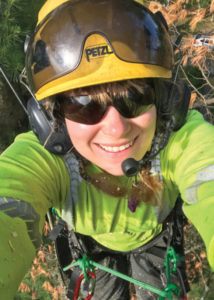
Shea removing a dead white pine
Not every company is as women-friendly, though. “The previous job I had was with all men: I was the only woman out of 20 staff. I worked really hard. And the guys that I worked with knew that I worked really hard. But I still got comments that you never want to have to deal with, especially at work,” DeAbreu recalls.
Being the only woman on staff often means feeling like you’re not just responsible for your work, you’re representing an entire gender—unfair, but that’s how many women in male-dominated industries are made to feel. “I had to work extra hard to prove that I wasn’t like what they thought women were like,” DeAbreu adds.
“In one interview I had before coming here, I was told, ‘We don’t have any females on our crew. If you get hired, you would be our first female crew,’” says Wetherell. “That felt extremely daunting.”
“I find it weird to think that I am ‘fortunate’ that I haven’t encountered as much of the workplace sexism as many of my peers,” admits Van Vliet. “No one should be in a position to say that, but that’s the reality of today’s world. Thankfully, it’s getting better; that is largely thanks to the women that entered this industry before my time.”
Maple Hill makes a point of ensuring that all workers feel safe and comfortable on-site. “I had an incident last year, where we were working at a condo and somebody from the condo came up and said, ‘It’s hot when women do dangerous work,’” Soucy recalls. “It was such a gross moment. I brought it up with my crew afterward, at our monthly safety meeting. I just wanted to make sure everyone was aware, and to thank the people who supported me in the situation. The next day our supervisor contacted the condo to ensure that [it] wouldn’t happen again. I was so impressed by the way my company dealt with that. I felt very supported.”
If you’re a woman considering a career change—or you know a woman who might be interested—there are plenty of resources available now. The training programs available include free government-run arborist pre-apprenticeship programs that will even set you up with potential employers; Ontario is particularly female-friendly in the arboriculture world.
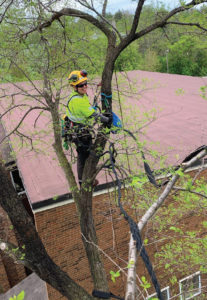
Jess installing Cobra Cables
“There is a group called Women in Arboriculture Ontario (WAO) that hosts local events to familiarize women with competitions, allows them to connect with women who are already in the industry/prospective employers and meet their peers in a very female positive environment,” says Van Vliet. “There are also Colleges women can reach out to like Algonquin, Fleming, and Humber. Also, there is the Ground Worker Training Program; an incredible, inclusive, free program for people looking to get into the industry. It even helps set the students up with future employment opportunities.”
And once you are in the industry, don’t assume every employer will be the same. “I think my biggest advice would be to find a place that suits you,” says Martin. “There are so many places to choose from, so look for a place that nurtures you to succeed in the industry you’ve chosen. I don’t know if I would still be here if I didn’t.”
“Find that place that accepts women and supports you,” echoes Wetherell. “It’s okay to say, ‘No, this place doesn’t treat me the right way, I’m going to find somewhere else that accepts me and the things that I can do on the job.’”
There are so many great opportunities for women in arboriculture – from climbing to plant health, consulting and beyond!
If you have questions, reach out to some of the women in the industry via social media. “The community of arboriculture is incredible. Pretty much anybody you reach out to who has an active social media account will answer questions you have,” Soucy says. “We’re so tight-knit, and we are so encouraging of more people getting into this industry and creating a positive learning environment.”
Molly Hurford is a journalist in love with all things cycling, running, nutrition and movement-related. When not outside, she’s writing about being outside and healthy habits of athletes and interviewing world-class athletes and scientists for The Consummate Athlete podcast and website. She also coaches running and cycling, as well as yoga both online and IRL in Collingwood, Ontario.